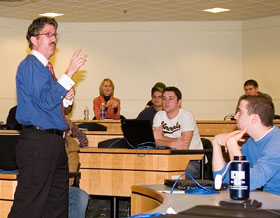  |
| HOME | THIS ISSUE | CALENDAR | GRANTS | BACK ISSUES | < BACK | NEXT > |
Tax profession ‘hot’ in post-Enron environment, says top execby David Bauman - January 30, 2006 |
||||
|
Juniors majoring in accounting in the School of Business had a top executive from one of the nation’s big four public accounting firms tell them that corporate financial scandals earlier this decade have made the tax profession “hot.” Guest lecturer Chet Wood, chairman and chief executive officer of Deloitte Tax LLP, a subsidiary of Deloitte & Touche, said that in the world of business, tax issues have gone from being virtually neglected to being the epicenter of how business gets done. Calling the period of turmoil between 2000 and 2004 “awesomely challenging for everyone in professional services,” Wood said last week that many business observers and regulators predicted the role of accountants and consultants would be diminished and that their clients would no longer trust them. In fact, the opposite has happened, he said: Headline-grabbing corporate financial scandals brought about by a relatively small number of dishonest people have led to strengthened roles for professional services. New laws, such as the Sarbanes-Oxley Act in 2002, to make corporations’ finances more transparent and hold executives responsible for financial disclosures, as well as a number of other new IRS and Securities Exchange Commission enforcements, have emphasized the importance of tax efficiency and placed compliance at the heart of sound reporting practices, Wood said. The services provided by audit and tax specialists are now more valued than ever, he said, as accounting systems and reporting tools have become vital to restore and maintain public trust in capital markets. At the same time, new services and ways of working have emerged, as the drive for efficiency, accountability, and better risk management have become standard procedures for leading companies, he added. Historically, because of the complexity of many tax rules and their implications, a number of tax-related ideas failed to get a full airing in boardrooms and audit committee meetings, Wood said. But as transparency in financial reporting has become more critical, tax directors, chief financial and operating officers, and their tax advisors have assumed a vital role in enhancing the efficiency of business and the quality of how business results are accounted for and recorded.
“In a post-Enron world, motivated by a shifting regulatory environment, we’ve become more valued for our ability to grasp and deconstruct highly complex issues, combining finely-honed technical skills with conceptual analysis, relationship building, and customer service,” he said. “We have gone from being ‘secret weapons’ to being critically important door openers,” Wood said. “Tax is no longer an April deadline or a once-a-year process. Tax decisions are made and assessed every day of the year.” Mohammed Hussein, professor and head of the accounting department, said that UConn’s accounting program is on a “select list” of all big four public accounting firms: PricewaterhouseCoopers, KPMG, Ernst & Young, and Deloitte & Touche. “They compete for our students,” Hussein said. “Hiring demand for experienced financial talent is rising quickly, as the big four seek knowledgeable accounting professionals to sort through the labyrinth of new regulations. They were all concerned that the corporate scandals would turn many kids away from careers in the accounting profession. However, the number of accounting majors has increased significantly at UConn and across the country.” |
| ADVANCE HOME UCONN HOME |

